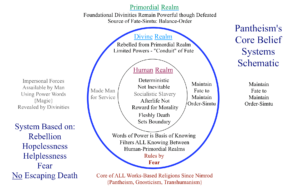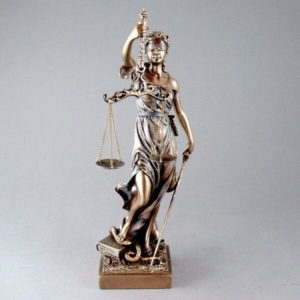
Ancient Paganism is Modern New Age Gnosticism
Ruled by Fate: Socialistic Slavery and Hopeless Death
Marriage of pantheism and science fiction (sci fi) in the Star Wars franchise has propagandized multiple generations into this great New Age characterized by the Hopelessness of the Force. Though these movies glossed over any real definition of what the Force was, or is; the underlying message was hopelessness and helplessness before those who could manage the Force {one never truly controls the Force}. The one supposed hero gives the alert viewer the truth: The Force feeds on the Hope of those who use it until all are defeated in fear and death. This is the true message of all the many forms of Pantheism: Gnosticism, New Agism, Transhumanism, etc. In ancient Mesopotamian culture this was called simtu, while today we follow the Greco-Roman tradition and simply call it Fate. This is the Force behind all Pantheisms; an inescapable Fate of Death: Nihilism at its best.
The ancient world was ruled by paganism: gods and goddesses who gave order to the universe and ruled over people’s lives; or so they believed. Modernism is basically defined as the throwing off of these ignorance based beliefs because of natural philosophy’s search for absolute truth. However, natural philosophy could not discover absolute truth; in fact, it could not define the various energies; it was limited by empiricism. In the 19th century, philosophy, nonempirical, finally parted ways with techno, renamed science, to create this modern world of gadgets. Modern people look back with disdain on ancient cultures as ignorant; however, they ignore their own ignorance and similarities to the ancient cultures’ belief systems. This is the first of a series of posts describing how ancient and modern cultural beliefs, religion-politico-cultural systems are the same in essence. Bible states that nothing is new; what is new is simply the recycled old in new packaging and terminology (Ec 1:1-11). Specifics may vary from culture to culture, time to time, but the generalities remain the same. This discussion will be guided by the above graphic adapted from the dissertation, The concept of fate in ancient Mesopotamia of the 1st millennium: Toward an understanding of ‘simtu.

All Religio-Politico-Cultural Systems {Governments}
Seek Order, Balance, {Justice} from the Divine Realm
Bible gives guidance in understanding human history in relationship to God. All people are conceived in sin and from birth reject God and His truth in both the nonempirical and empirical realms (Ps 51:5; Ro 1:18-28). Man developed a Religio-Politico-Cultural system since Nimrod. When peoples were divided at Babel this Religio-Politico-Cultural system became the foundational belief system for all cultures with modification for specific cultures over time (Ge 10:8-10; 11:1-9). Lost modern people reject this foundational understanding preferring instead an evolutionary approach that is both internally inconsistent and externally incoherent with observed reality and Scripture; but, that is the essence of asebeia, ungodliness (2Pe 3:3-10). The promise of each Religio-Politico-Cultural system {government} is the promise of order or balance because it is consistent with the perceived forces of the universe; this is the same today as then but with different labels. The above schematic will guide our discussion.
According to man’s Religio-Politico-Cultural system, the divinities, pantheon, made man simply to serve them setting the pattern for the masses to serve the elites which is called Socialism today. Man is unique in that he possesses a fleshly body that is doomed to death. The divine realm may have bodies but they are not limited to their realm nor are they afflicted with death unless, in some cultures, they may die at the hand of another in an unnatural or untimely death. The leader of the Religio-Politico-Cultural system is the direct intercessor between society and the pantheon with the assistance of a priesthood. A military force is tasked with maintaining internal order {balance} and external projection of one’s truth onto others {war}. A wealthy elite assist in economic health of the society while the leader is further assisted with a bureaucracy of scribes, officials and wise men who practice extispicy, divination to know the mind of the gods and goddesses.
Since ancient Mesopotamian cultures were the basis of all subsequent cultures we will examine its understanding of fate and how it influenced Greco-Roman understanding which became the basis of Western culture. Fate did not flow from the pantheon to man; rather, it was an impersonal force that originated from those divinities originally deposed. The current pantheon acts simply as the conduit of fate: knowledge of each person’s point of death. This knowledge was hidden from man but could be knowable in some obscure fashion given the proper rituals. The main Mesopotamian, Marduk, was caretaker of a written book, Tablet of Destinies, which he used to maintain order or balance in nature, nations and individual lives. However, this Tablet could be stolen, and was. But, the unrightfully possessor of the Tablet could access power via incantations but could not maintain order; he, or she, was not the rightful possessor. When Marduk regained the Tablet, order or balance was restored by ascendency of the government over others. Notice the resemblance to good Force and dark Force?
Man could obtain access to this knowledge via prayers, offerings and ritual incantations. Gods would reveal this knowledge via omens or apodosis-protasis {if-then} conditional statements. People would receive incantations unlocking this impersonal force to avoid unnatural death; i.e., murder, in war, etc. However, one could never avoid death; it was the deterministic order of life. Thus, fate was deterministic but not inevitable {unnatural death}.

Greco-Roman Titaness, Themis & her daughter Justitia;
Reveal Fate and are our symbol of Law & Order: Balance
Altering natural fate would cause chaos. When Zeus weighed Hector’s and Achilles’ deaths in his scales because he wanted to save Hector; Hera told him that if he did this against the Fates, so would every other god and goddess; chaos would ensue (The Iliad). The major focus of pantheism was living according to one’s natural fate, serving the gods who preyed upon them arbitrarily {rape, pestilence, wars, etc.} to maintain order in both life and nature. Death was no relief being understood as a continuation of a shadowy life of hopelessness and helplessness without hope. There was no moral focus; just the maintenance of fate to keep balance. Fear was the one constant guiding all people in pantheism. Fear of offending some major or minor deity resulting in imbalance in one’s life evidenced by unexpected war, death, disease, poverty and so forth. Man was forced to look to the gods but the gods were not forced, or expected, to save people; they were expendable.
The Bible states that people are not actually worshipping deities, they are worshipping Satan and his fallen angels, demons (De 32:17; 1Co 10:20). The only true idol is covetousness (Col 3:5). Satan wanted to be as God, man wants to be as gods; all want something other than God’s plan of salvation (Ge 3:4-5; Isa 14:13-14). All have chosen death ignoring the warning of God; instead, man chooses to continue to worship death while developing a plan to cheat death and thus escape judgment and God’s reality (Ge 2:16-17).
God allows all sinners to live their dream, a world without God, so that some may be saved (Ro 1:18-25). They are not following gods that are not real, they are following Satan who is very real as we will discuss in our next post (Jn 8:44). God is not mocked, what you sow, you will reap whether God and life or sin and death (Ga 6:7-8). This is the incoherency, the blindness of clinging to a Religio-Politico-Cultural system that blatantly heralds one’s worthlessness, hopelessness and helplessness at the hands of those elites, including Satan, who seek to use and discard you to better themselves. This ensures one’s spiritual death (Re 20:11-15). Just as the Force only brought death in Star Wars; the bad Jedi easily destroyed all the good Jedi leaving Luke to reject the Force even as it destroys him. Modern Fate only promises eternal death while empowering the evil about you.
